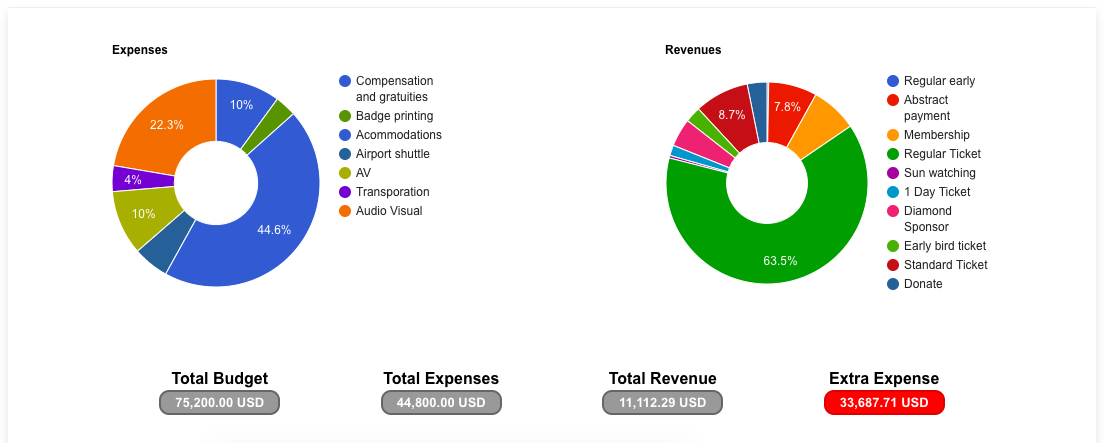
Planning an event, no matter the scale, requires careful budgeting to ensure success. Contrary to popular belief, a larger budget doesn’t always guarantee a better event. With smart strategies, creativity, and resourcefulness, you can deliver an impeccably executed event without overspending. Here’s a guide on how to plan and run a successful event on a limited budget.
☑ #1 Start Early: Time Is Your Best Asset
The earlier you start, the more control you have over your budget and planning. Early preparation allows you to:
- Evaluate and eliminate unnecessary expenses.
- Secure better deals on venues and vendors before peak booking periods.
- Allocate ample time for negotiations, team formation, and strategy refinement.
An early start also gives you the advantage of creating a well-rounded event that incorporates thoughtful elements, meaningful interactions, and activities that can maximize its impact.
☑ #2 Learn from the Past: Use Historical Data
If you’ve hosted similar events in the past, analyze their budgets for valuable insights. Look at previous expenses for venue rentals, vendor charges, marketing efforts, and attendee management. Understanding how costs were distributed will help you anticipate expenditures and avoid repeating mistakes. Use this knowledge to fine-tune your current budget and start with a clear roadmap.
☑ #3 Leverage Cost-Saving Tools
In today’s tech-savvy world, numerous tools can help you streamline event planning while saving costs:
- Use social media platforms for free or low-cost event marketing.
- Opt for online budget templates to organize your finances.
- Try an all-in-one event management tool like Dryfta to manage registration, ticketing, marketing, and scheduling in one unified interface.
Such tools not only save time but also minimize the need for additional resources, enabling you to cut costs significantly.
☑ #4 Go Digital: Ditch Paper-Based Processes
Paper-based processes are not only costly but also prone to errors. Digitizing your workflows can:
- Streamline communication and coordination among team members.
- Reduce the chances of mismanagement, delays, or omissions.
- Ensure all stakeholders receive updates in real time.
By centralizing data and sharing it digitally, you can enhance efficiency and maintain transparency across all levels of planning.
☑ #5 Tap into Volunteer Resources
Volunteers can be a tremendous asset to your event. Reach out to students, interns, or young professionals looking for hands-on experience in event planning. They bring enthusiasm, fresh ideas, and a willingness to learn.
In return, offer them:
- Certificates or letters of recommendation.
- Networking opportunities with industry professionals.
- A chance to contribute meaningfully to a large-scale event.
Treat your volunteers as valuable team members, empowering them with real responsibilities while fostering a collaborative environment.
☑ #6 Master the Art of Negotiation
When dealing with vendors, never settle for the first quote. Vendors often inflate initial pricing in anticipation of negotiations. Request multiple quotes and use competitive pricing as leverage. Build relationships with both new and existing vendors to secure better deals without compromising on quality.
Negotiation tips:
- Be clear about your budget limits.
- Ask for bundled packages or discounts for repeat business.
- Offer referrals or testimonials in exchange for a reduced rate.
☑ #7 Minimize Room for Error
Unexpected errors often lead to unplanned expenses. While external disruptions may be out of your control, internal inefficiencies can be mitigated with preparation:
- Conduct thorough team briefings and assign clear roles.
- Test-run all technology, equipment, and setups before the event.
- Double-check logistics, such as vendor arrivals, schedules, and attendee materials.
By addressing potential issues beforehand, you can reduce the likelihood of costly mistakes on event day.
☑ #8 Budget for Contingencies
Even the most meticulously planned events encounter unforeseen challenges. Allocate a contingency budget to handle last-minute expenses like:
- Additional staff or materials.
- Emergency repairs or replacements.
- Unplanned catering requirements.
A contingency fund ensures you’re prepared for surprises, allowing you to manage hiccups without derailing the event.
☑ #9 Track Expenses and Measure ROI
Tracking your expenses and revenues is critical to staying on budget and understanding your event’s financial success. Tools like Dryfta’s Budget Manager offer real-time insights into:
- Total revenue and expenses.
- Pending payments and dues.
- Profitability and loss statements.
By closely monitoring your finances, you can make informed decisions, identify cost-saving opportunities, and measure the ROI of your event.
Cost-Saving Tips to Stretch Your Budget Further
- Venue Selection: Opt for cost-effective venues such as community halls, parks, or coworking spaces. Consider off-peak days or times to negotiate lower rates.
- DIY Decor: Use creative, budget-friendly decorations like handmade centerpieces, recycled materials, or minimalistic themes.
- Sponsorships: Partner with local businesses or organizations to sponsor parts of your event in exchange for branding opportunities.
- Crowdsourcing: Engage attendees by crowdsourcing event ideas or materials, such as community-contributed content or DIY workshops.
- In-House Catering: If feasible, consider self-catering or working with a local culinary school for cost-effective food services.
Benefits of Running a Budget-Friendly Event
1. Increased Creativity
Working with limited resources often sparks creativity, encouraging you to think outside the box and come up with innovative solutions.
2. Stronger Team Bonding
Collaborating with a lean team fosters camaraderie and encourages everyone to contribute ideas and efforts.
3. Improved ROI
By minimizing costs and maximizing efficiency, you can achieve higher profitability and better returns on your investment.
Maximizing Value on a Shoestring Budget
Planning an event on a tight budget isn’t just possible—it can lead to highly successful outcomes when approached strategically. With early planning, resourceful tools, and a focus on efficiency, you can deliver an exceptional experience without breaking the bank.
Remember these key takeaways:
- Start planning early to avoid rushed decisions and inflated costs.
- Use tools like Dryfta to digitize and streamline processes.
- Empower volunteers and negotiate effectively to optimize your resources.
- Track every expense and prepare for contingencies to stay on track.
By adopting these practices, you’ll be equipped to execute an event that’s cost-effective, impactful, and memorable. After all, it’s not about how much you spend—it’s about how wisely you use what you have.
Get started today and see how strategic planning can turn your shoestring budget into a spectacular event!





